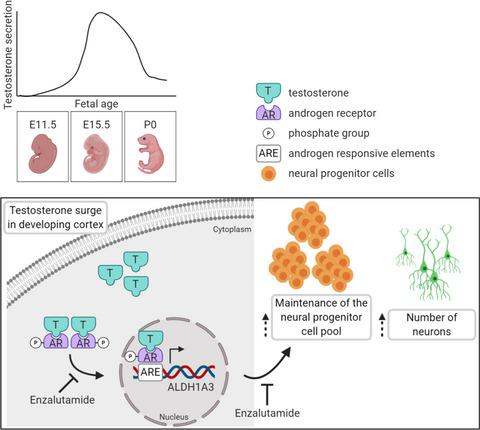当前位置:
X-MOL 学术
›
J. Neurochem.
›
论文详情
Our official English website, www.x-mol.net, welcomes your
feedback! (Note: you will need to create a separate account there.)
Androgen Receptor signaling promotes the neural progenitor cell pool in the developing cortex
Journal of Neurochemistry ( IF 4.2 ) Pub Date : 2020-09-21 , DOI: 10.1111/jnc.15192 Piergiorgio La Rosa 1, 2 , Giulia Bartoli 1 , Stefano Farioli Vecchioli 3 , Eleonora Cesari 4, 5 , Vittoria Pagliarini 4, 5 , Claudio Sette 2, 4
Journal of Neurochemistry ( IF 4.2 ) Pub Date : 2020-09-21 , DOI: 10.1111/jnc.15192 Piergiorgio La Rosa 1, 2 , Giulia Bartoli 1 , Stefano Farioli Vecchioli 3 , Eleonora Cesari 4, 5 , Vittoria Pagliarini 4, 5 , Claudio Sette 2, 4
Affiliation

|
Neural Progenitor Cells (NPCs) are multipotent cells that are able to self-renew and differentiate into neurons. The size of the initial pool of NPCs during the brain development strongly affects the number of neurons that compose cortical multi-layer during development. Gonadal hormones can influence the balance between self-renewal and differentiation processes. Herein, we investigated the role of dihydrotestosterone (DHT), the active metabolite of testosterone, in the regulation of NPC stemness and differentiation. First, we evaluated the expression of the androgen receptor (AR), the transcription factor activated by DHT that mediates the physiological effects of androgens, in NPCs. Western blot analysis showed that DHT-mediated activation of AR induces mitogenic signaling pathways (PI3K/AKT and MAPK/ERK) in NPCs, whereas luciferase activity assays demonstrated the induction of AR transcriptional activity. AR activation mediated by DHT treatment strongly increased the proliferation of NPCs and reduced their propensity to differentiate into neurons. Furthermore, the effects of AR activation were mediated, at least in part, by increased expression of Aldehyde Dehydrogenase 1 Family Member A3 enzyme (ALDH1A3). Pharmacological inhibition of ALDH activity with N,N-diethylaminobenzaldehyde (DEAB) reduced the effect of DHT on NPC proliferation in vitro. Furthermore, inhibition of AR activity by Enzalutamide reduced the NPC pool in the developing cortex of male C57/BL6 mouse embryos. These findings indicate that androgens engage an AR-dependent signaling pathway that impact on neurogenesis by increasing the NPC pool in the developing mouse cortex.
中文翻译:

雄激素受体信号传导促进发育中皮层的神经祖细胞池
神经祖细胞(NPC)是能够自我更新并分化为神经元的多能细胞。在大脑发育过程中,NPC初始池的大小会强烈影响发育过程中组成皮质多层的神经元数量。性腺激素可以影响自我更新和分化过程之间的平衡。在这里,我们调查了二氢睾丸激素(DHT),睾丸激素的活性代谢产物,在调节NPC干细胞和分化中的作用。首先,我们评估了NPC中雄激素受体(AR)的表达,该受体是由DHT激活的介导雄激素生理作用的转录因子。蛋白质印迹分析表明,DHT介导的AR激活可诱导NPC中的促有丝分裂信号通路(PI3K / AKT和MAPK / ERK),萤光素酶活性测定表明AR转录活性的诱导。DHT处理介导的AR激活极大地增加了NPC的增殖,并降低了它们分化为神经元的倾向。此外,AR活化的作用至少部分地通过醛脱氢酶1家族成员A3酶(ALDH1A3)的表达增加来介导。用N,N-二乙基氨基苯甲醛(DEAB)抑制ALDH活性的药理作用降低了DHT对NPC体外增殖的影响。此外,Enzalutamide对AR活性的抑制作用减少了雄性C57 / BL6小鼠胚胎发育皮层中的NPC库。这些发现表明,雄激素通过增加发育中的小鼠皮层中的NPC池而参与了AR依赖性的信号传导途径,该途径会影响神经发生。
更新日期:2020-09-21
中文翻译:

雄激素受体信号传导促进发育中皮层的神经祖细胞池
神经祖细胞(NPC)是能够自我更新并分化为神经元的多能细胞。在大脑发育过程中,NPC初始池的大小会强烈影响发育过程中组成皮质多层的神经元数量。性腺激素可以影响自我更新和分化过程之间的平衡。在这里,我们调查了二氢睾丸激素(DHT),睾丸激素的活性代谢产物,在调节NPC干细胞和分化中的作用。首先,我们评估了NPC中雄激素受体(AR)的表达,该受体是由DHT激活的介导雄激素生理作用的转录因子。蛋白质印迹分析表明,DHT介导的AR激活可诱导NPC中的促有丝分裂信号通路(PI3K / AKT和MAPK / ERK),萤光素酶活性测定表明AR转录活性的诱导。DHT处理介导的AR激活极大地增加了NPC的增殖,并降低了它们分化为神经元的倾向。此外,AR活化的作用至少部分地通过醛脱氢酶1家族成员A3酶(ALDH1A3)的表达增加来介导。用N,N-二乙基氨基苯甲醛(DEAB)抑制ALDH活性的药理作用降低了DHT对NPC体外增殖的影响。此外,Enzalutamide对AR活性的抑制作用减少了雄性C57 / BL6小鼠胚胎发育皮层中的NPC库。这些发现表明,雄激素通过增加发育中的小鼠皮层中的NPC池而参与了AR依赖性的信号传导途径,该途径会影响神经发生。











































 京公网安备 11010802027423号
京公网安备 11010802027423号